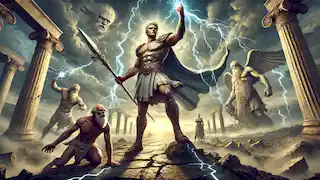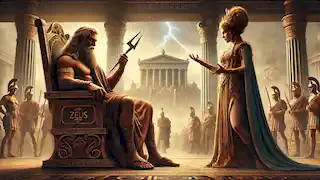In the heart of ancient Greece, where myth and legend shaped the lives of the people, the tale of Zeus and Hera stands out as one of the most powerful stories of love, conflict, and divine rule. The mighty Zeus, king of the gods, and Hera, his queen, reigned supreme over Olympus, but their relationship was far from serene. Through jealousy, power struggles, and acts of revenge, their story reflects the complexities of both divine and human emotions. This is the story of Zeus and Hera, the rulers of Olympus, and how their fates were forever intertwined. The world was in chaos. The Titans, ancient and powerful, ruled over both heaven and earth. Cronus, the leader of the Titans, feared that one of his children would overthrow him just as he had overthrown his own father. To prevent this, Cronus devoured each of his offspring at birth. But when Zeus was born, Rhea, his mother, devised a plan to save him. She wrapped a stone in swaddling clothes and handed it to Cronus, who swallowed it, thinking it was the infant Zeus. Meanwhile, the real Zeus was whisked away to the island of Crete, where he was raised in secret. Hidden from his father's wrath, Zeus grew strong, his destiny clear: to overthrow Cronus and free his siblings from the belly of the tyrant. As Zeus matured, he gathered allies, including his brothers Poseidon and Hades. Together, they waged war against the Titans in what became known as the Titanomachy. The battle raged for years, shaking the very foundations of the cosmos. But in the end, it was Zeus who triumphed, casting Cronus and the other Titans into the depths of Tartarus, a prison so deep that no one could escape. With the Titans vanquished, Zeus claimed the throne of the heavens and became the supreme ruler of the gods. His reign began with promise, and he quickly divided the realms among his brothers. Poseidon took the sea, Hades the underworld, and Zeus the sky, with the earth shared by all. Yet, as he assumed his place as king, Zeus sought a queen, and his eyes turned toward Hera, the goddess of marriage and family. Hera was the sister of Zeus, born of Cronus and Rhea, just as he was. Despite their shared lineage, Hera had grown into a goddess of striking beauty and immense power in her own right. She embodied dignity and authority, often seen as the protector of women and family. For Zeus, there was no other goddess who could match her in strength or grace. Yet, Hera was not easily wooed. Zeus, known for his many romantic pursuits, had earned a reputation as a relentless suitor. He pursued Hera with great fervor, yet she resisted his advances, wary of his reputation and knowing that to marry Zeus would be to take on a complex and often burdensome role. However, Zeus was nothing if not persistent. The myths tell that Zeus transformed himself into a small, defenseless bird, seeking shelter in Hera's arms. Moved by compassion, she took the bird close to her, only for Zeus to reveal his true form. Caught off guard, Hera finally consented to marry him, believing that she could tame his wandering heart and share his throne. Their wedding was a grand affair, celebrated across the heavens with all the gods in attendance. Their union marked the beginning of a new era for Olympus, with Zeus as the ultimate ruler and Hera as his queen. However, the seeds of discord were already sown, for Zeus' infidelity would soon test their relationship. As queen of the gods, Hera's role was to maintain order and uphold justice, particularly in the realm of marriage and family. But Zeus, despite his love for Hera, was not content with a single partner. His desires led him to pursue goddesses, nymphs, and mortals alike, often resulting in numerous affairs that brought him both pleasure and trouble. Hera, in her wisdom, knew of Zeus' indiscretions. Her jealousy, however, did not stem from weakness but from the deep pain that his actions caused her. She was not a passive goddess, nor would she stand idly by while her husband cavorted with others. Time and again, Hera sought revenge on the women Zeus seduced, and often their offspring as well. One of the most famous tales of Hera's wrath is the story of Heracles, the son of Zeus and the mortal woman Alcmene. From the moment Heracles was born, Hera harbored a deep hatred for him. She sent two serpents to kill him in his crib, but even as an infant, Heracles' strength prevailed, and he strangled the snakes with his bare hands. Her relentless pursuit of Heracles continued throughout his life, as she sent one trial after another in an attempt to destroy him. Yet, Hera's anger was not reserved solely for Zeus' mortal lovers and their children. Even goddesses were not immune to her fury. When Zeus turned his affections to the goddess Io, Hera transformed the beautiful nymph into a cow and set the many-eyed giant Argus to guard her. But Zeus, determined as ever, sent Hermes to slay Argus and free Io. Though these stories depict Hera as vengeful, they also highlight her unyielding sense of justice. She upheld the sacred vows of marriage and punished those who dared threaten her domain. In many ways, Hera’s actions reflected the struggles of mortal women who faced betrayal and heartbreak, and she became a symbol of resilience in the face of adversity. The relationship between Zeus and Hera was often tumultuous, and their quarrels became legendary among the gods. Though Zeus wielded the thunderbolt and ruled with unmatched power, Hera was no less formidable. She often challenged him, using her cunning and influence to counter his authority. One famous incident occurred during the Trojan War, when Hera and Zeus found themselves on opposing sides. Hera favored the Greeks, while Zeus, at times, showed support for the Trojans. Their disagreements reached a boiling point when Hera conspired with Poseidon and Athena to overthrow Zeus temporarily. Though their plan failed, it demonstrated Hera’s willingness to defy even the king of the gods when she believed his actions were unjust. Their marriage was a constant power struggle, with each testing the other's limits. Yet, despite the frequent conflicts, Zeus and Hera remained deeply connected. There was a mutual respect between them, forged by centuries of ruling together. While Zeus may have strayed from their marriage, he always returned to Hera, and she, in turn, stood by his side as queen. It was not just personal battles that defined their relationship, but also their shared duty to govern the cosmos. Together, they balanced the forces of nature, ensuring that the universe remained in order. Zeus' role as the ruler of the heavens complemented Hera's position as the protector of family and the sanctity of marriage. In many ways, their bond, though fraught with challenges, symbolized the union of power and stability in the world of the gods. As time passed, the myths of Zeus and Hera continued to evolve, each generation of storytellers adding new layers to their complex relationship. Though often depicted as a tumultuous couple, their story also emphasized the importance of balance in both divine and mortal realms. Zeus, with his thunderbolt, represented the raw power of the cosmos, capable of both creation and destruction. Hera, on the other hand, stood for the order and structure that held everything together. Their union was a reflection of the dual forces that governed the universe – chaos and order, freedom and responsibility, love and loyalty. Despite their differences, Zeus and Hera shared a deep bond, one that transcended their personal quarrels. They ruled Olympus together, and through their reign, they ensured the continuation of the divine order. Their story serves as a reminder that even the gods, with all their might, faced the same struggles as mortals – love, betrayal, anger, and forgiveness. The legacy of Zeus and Hera is one of both conflict and unity, a testament to the complexities of love and power. Though their relationship was far from perfect, it endured the test of time, shaping the world of the gods and the lives of those who worshiped them. In modern times, the story of Zeus and Hera remains a powerful symbol of the ancient Greek understanding of marriage and authority. Their tales of conflict and reconciliation continue to resonate, reminding us of the fragile balance between power and love. Hera, the fierce protector of family, and Zeus, the mighty ruler of the heavens, embody the dual aspects of life – strength and vulnerability, passion and reason. The myths of Zeus and Hera have been passed down through the ages, not only as entertainment but as lessons on the nature of relationships. Their story reflects the highs and lows of partnership, the importance of communication, and the challenges of loyalty. Despite their godly status, their struggles mirror the experiences of ordinary people, making them relatable figures even in modern times. Through their union, Zeus and Hera left an indelible mark on the world of Greek mythology. Their reign over Olympus was not just a tale of power but a reflection of the human condition – flawed, complex, and deeply intertwined with the forces of love and conflict. The story of Zeus and Hera, with all its trials and triumphs, is one of the most enduring legends from ancient Greece. It highlights not only the grandeur of the gods but also their very human emotions and experiences. In Zeus and Hera, we see a reflection of the complexities of marriage, power, and loyalty – themes that remain relevant even today. Their story serves as both a cautionary tale and a symbol of resilience. Despite the challenges they faced, Zeus and Hera remained together, ruling over the gods and the mortal world alike. Their legacy continues to inspire, reminding us that even in the realm of the divine, love and power are forces that must be carefully balanced.The Rise of Zeus

Courtship of Hera
The Trials of Hera

Power Struggles on Olympus
The Legacy of Zeus and Hera

Enduring Symbolism
Conclusion

The Story of Zeus and Hera
Reading Time: 9 min

About Story: The Story of Zeus and Hera is a Myth Stories from greece set in the Ancient Stories. This Dramatic Stories tale explores themes of Justice Stories and is suitable for All Ages Stories. It offers Cultural Stories insights. The timeless myth of Zeus and Hera: a tale of love, power, and divine rivalry.


















